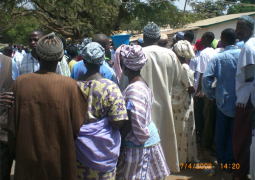According to statement by ECHO sent to The Point on 8 May 2015, this is the latest in a series of contributions that ECHO has sent UNICEF since 2012 to support the country’s emergency nutrition response focussing on the prevention and treatment of Severe Acute Malnutrition (SAM) in over 30,000 children five years of age in all regions of The Gambia. Malnutrition is a significant contributor to child morbidity and mortality in The Gambia.
“UNICEF, the government of The Gambia and the children are extremely grateful to ECHO for its consistent contributions to improving the nutrition status of children,” said UNICEF’s Deputy Representative and Officer-in-Charge, Mr. Rupert Leighton. “The latest funding received from ECHO, with contribution from the United Kingdom Department for International Development (UKaid), will enable UNICEF to target more vulnerable children with preventive measures as well as treatment and support.”
In close collaboration with the Ministry of Health and Social Welfare and the National Nutrition Agency, UNICEF will ensure that the funds received contribute to assessing the prevalence of malnutrition through a national nutrition survey using Standardized Monitoring and Assessment of Relief Transitions (SMART) methods. Further, nutritional commodities and products such as Ready To Use Therapeutic Foods (RUTF) and milk powder will be provided to targeted SAM children under five while health workers will be trained on the management of SAM, promotion of improved Infant and Young Child Feeding practices and personal and household hygiene and sanitation to prevent malnutrition among children under five.
Over the years, thanks to the support from ECHO and other partners, UNICEF, the Ministry of Health and Social Welfare and the National Nutrition Agency have implemented life-saving nutrition interventions through both regular programming and as part of the nutrition response targeting particularly at-risk children. In addition to conducting a SMART survey every two years, health workers have been trained on assessing and managing SAM cases and products to support SAM treatment (drugs, therapeutic milk, RUTF) have been continually purchased. In 2012, ECHO funds allowed the National Nutrition Agency to revise and update the national protocol on the Integrated Management of Acute Malnutrition (IMAM) to align it with international standards.
In 2014 alone, nearly 4,492 children with SAM were reached with therapeutic care and hygiene messages while 90 health workers were trained in inpatient management of SAM. Drugs for the treatment of SAM were also procured and support provided to expand IMAM sites from 14 to 19.



